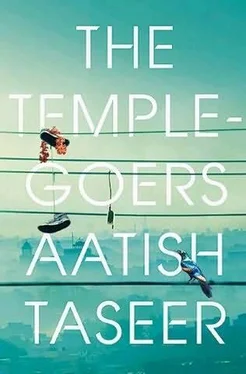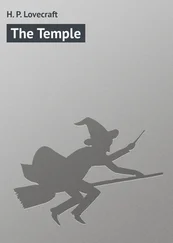‘What did they say?’ I asked.
‘They told him to go away. They told him to go away. They told him to take his art collection and go away,’ the writer said, laughing, his eyes widening. His repetition made simple and ordinary something shocking, in turn deepening its effect. His laughter rang out as if no calamity was great enough to smother its rumble.
‘Where is it now?’ I asked.
‘It’s in Boston.’ He chortled. ‘It’s in Boston.’
A few Indians, middle-class-seeming people with cameras, sauntered in. The writer’s wife took this as an opportunity to challenge her husband’s earlier claim that English-speaking Indians were not interested in India’s antiquities. ‘Look, they’ve come,’ she said.
‘They’ve come for the jewels. Yes, yes, they’ve come for the Nizam’s jewels. Their grandparents were taxed to death for the Nizam to have those jewels. And he didn’t do a thing; he just handled his jewels. The Left adores the Nizam.’
Then suddenly, our visit seeming to wind down, the writer became urgent. ‘You’ll come back,’ he said, ‘and you’ll look at these things. You’ll look at what we’ve seen and then move on.’
Walking out, we passed a map of the places from where the antiquities had come. It annoyed the writer; it seemed to show nothing but the actual digs, with no historical or geographical points of reference. He saw one place somewhere near Calcutta; ‘the Calcutta Museum,’ he said, ‘had a good collection, but kept badly. I think they would like to destroy them,’ he added, ‘but they can’t. So they do the next best thing: they let the workers watch them. Yes, they let the workers watch them.’
Another group of Indians, in bold colours, were coming in just as we were leaving. They seemed from the south, with teekas on their foreheads and flowers in their hair. They were laughing and visibly excited by what they saw.
‘You see my point,’ the writer said. ‘The people who come are the temple-goers and the ones who stay away are…’
‘The anglicized…’ his wife started.
‘The green-card folk,’ the writer offered, and laughed deeply.
Sanyogita didn’t like the writer. She felt he wasn’t kind; that was her word. She had begun many books of his. I think she read them for my sake rather than out of any real interest; and later I felt she left them unfinished for the same reason. One lay by her bedside now.
‘I can’t!’ she said, standing in front of a dressing-table mirror, her head cocked to one side as she put in an earring, ‘I just can’t. I’ve tried, but they’re so dry. And he’s not kind to his subjects.’
‘What do you mean “not kind”? What’s kind got to do with it?’
‘Well,’ she said, ‘I don’t think he shows any compassion to the people he writes about.’
‘Isn’t just being plain honest a kind of compassion? Doesn’t it give back to people a kind of dignity, just to judge them by your own good standards and not as people who’ve been colonized, defeated, oppressed or enslaved?’
She didn’t answer; she was having trouble finding the hole. The earring slipped and clattered across the floor. Sanyogita, already in her heels, squatted down in one movement. But when she found it, it was broken. It was one of Ra’s earrings, the one with the moonstone and the ruby. The moonstone was missing. It left a visible vacancy.
‘Baby!’ Sanyogita cried, and squatted down again, feeling around the floor for the stone. We found it under her dressing table, covered in wisps of dirt and dust. She handled the little paisley-shaped stone as though it were a chick that had fallen from its nest. She found these small, inauspicious tragedies very moving; they could almost reduce her to tears. Then she saw that I was squatting down next to her and she smiled. She reached a long arm up to my ear, rubbed its rim between her fingers and rose in one movement.
‘No big deal, right? I’ll get Ra to fix it. When are we meeting your mother?’
‘Now.’
‘OK, I’ll hurry.’
My mother had flown in from Bombay for two nights. She was having dinner with Sanyogita and me tonight; the following night, she was having her dinner for the writer. We were meeting her at the new Italian restaurant in the Oberoi.
Outside on the garden terrace, the frangipani, its branches now completely bare, had shrivelled in its pot. But my premonition had been wrong. It was not the first casualty of a larger pestilence; the other plants were flourishing. From the shaft of light falling on the corridor, I could see the door to my study. Its brass Godrej lock hung heavily from the bolt; it hadn’t been opened since my return.
Sanyogita herself had only come back the night before. She appeared in the corridor a few seconds later.
The Oberoi Hotel attracted a variety of people. Politicians in white waited for white cars with red lights. Young men in maroon shirts with black trousers and brushed-steel belt buckles wandered in. A woman in a pink salwar kameez stepped out of a blue Mercedes. The hotel’s lobby was of black granite and heavily air-conditioned. There was a white marble fountain in the middle, with red rose petals circling on its glassy surface. On the way to the restaurant, we saw the hotel swimming pool through glass panels many metres below, brightly lit and blue in the darkness.
The restaurant had tall grey leather chairs. The tables were made of a faux-rustic stone and were very far apart. My mother, bejewelled and in a black and gold silk sari, tapped out a text message in front of a wavy, illuminated panel of frosted glass.
Because my mother had brought me up alone and our closeness was almost embarrassing since I was now technically a man, we played at being offhand with each other. And so even after not seeing me for months, she gave me a brief hug, said I was looking skinny and fell into Sanyogita’s arms. While they spoke about jet lag and the summer, a young man in white brought a bottle of Himalaya water to the table, then bowed in a deep namaste and went away.
‘That’s new!’ I said to my mother as we sat down.
‘I know! Isn’t it amazing? Biki has them all doing it.’
Biki was Biki Oberoi, the owner of the hotel.
‘He must have picked it up in the East,’ I said, remembering the time when you couldn’t even come into the hotel’s restaurants in Indian clothes.
‘Isn’t that strange,’ my mother said, ‘that it should have gone from here to there as a greeting, hundreds of years ago, and has now returned via Biki Oberoi?’
We had barely sat down when I felt my phone vibrate for the third time since we had arrived. I didn’t answer it, but was curious as to who it was: Aakash, all three times. My mother and Sanyogita were talking about Chamunda, about the dinner the next day, about the blasts and demonstrations in the old city as a result of a police encounter. I was sending a text message, asking Aakash what the matter was, when my mother suddenly said, ‘Baba, have you called Zafar to see if he’s OK?’
The question put my back up. Both because I hadn’t spoken to Zafar since I arrived and because Sanyogita, having seen me check my phone for the third time, and guessing who it was, compressed her lips. My mother, an observer of these currents, badgered me for many minutes about how wrong it was. ‘Your poor old teacher,’ she said, ‘alone in the walled city at a time like this. How uncaring can you be, Aatish! And to a man who has given you so much, really.’
‘Ma, he’s not alone! He has a family. I’ll call him.’
‘It’s the bad Pakistani blood,’ my mother said, shaking her head, and withholding a smile, turned to Sanyogita. ‘It’s from the father. I’ve done what I can to improve it, but still it remains.’
Читать дальше












